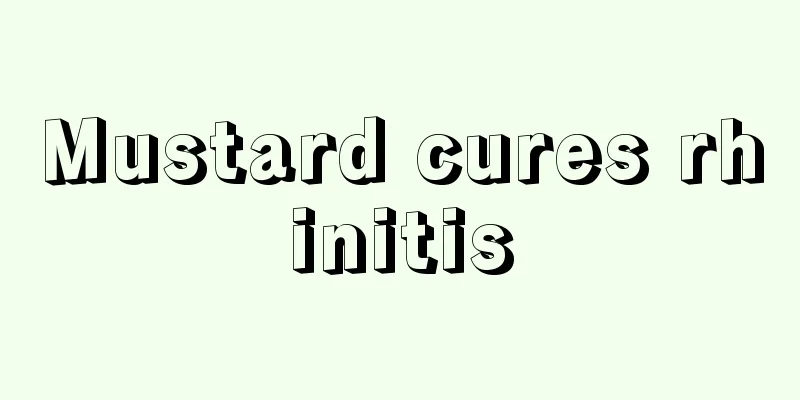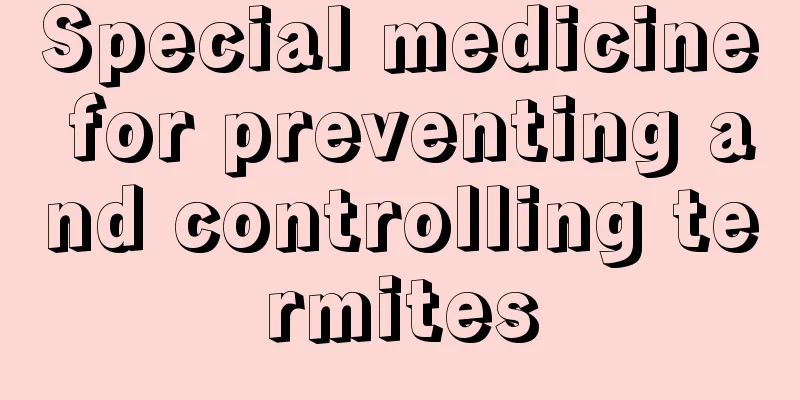Mustard cures rhinitis

|
Mustard is a condiment with a pungent taste. You may not like to eat it normally, but mustard still has certain nutritional value. Mustard has a strong detoxification function and can detoxify fish and crabs, so it is often eaten with salmon. Mustard oil also has the effect of beautifying and nourishing the skin. Mustard can also treat rhinitis. What is the specific method of using mustard to treat rhinitis? Is it really that effective? Let me introduce it to you. Mustard for rhinitis Mustard is pungent and warm in nature, and has the effects of warming the lungs and removing phlegm, unblocking meridians and relieving pain, resolving phlegm and promoting qi, and dispersing nodules and reducing swelling. The properties of mustard can be used to treat rhinitis, especially allergic rhinitis. It is also effective for nasal congestion, runny nose and tears caused by colds. Specific method: Soak mustard in vinegar for several days (if needed urgently, put the mustard in a bowl, then pour in boiling water and simmer for half an hour before use, or use mustard oil instead), mix it with cold dishes such as spinach, cabbage, vermicelli, cucumber, etc., and can also be used to dip dumplings. There are many ways to eat it, each with its own unique flavor, and it works every time. Six dietary taboos for rhinitis 1. Avoid smoking. Allergic rhinitis is significantly more sensitive to external gases, especially cold and irritating gases. After inhalation, symptoms such as sneezing, nasal congestion, and runny nose will be significantly aggravated, so it is advisable to avoid smoking. 2. Avoid eating cold and raw foods. Traditional Chinese medicine believes that this disease is caused by deficiency of qi in the lungs, spleen, and kidneys, coupled with external wind and cold invading the nasal cavity. Cold and raw foods (such as raw and cold fruits, cold water, cold dishes, etc.) are most likely to damage the lung and spleen yang energy and aggravate the symptoms of deficiency and cold. 3. Be cautious when eating milk, eggs, fish, shrimp and crabs. Some people believe that foods such as milk, eggs, shrimp, and crabs are prone to cause allergic reactions, so they should be avoided when suffering from allergic diseases. Avoid beef, coffee-containing beverages, chocolate, citrus juice, corn, dairy products, eggs, oats, cherries, peanuts, salmon, strawberries, cantaloupe, tomatoes, wheat, etc. 4. Avoid spicy food. Such as pepper, mustard, etc., can easily irritate the respiratory mucosa. 5. Avoid eating foods that have been specially processed or refined, especially foods containing yellow pigment No. 5. 6. Avoid eating foods containing food additives such as vanillin, benzaldehyde, linalool, and monosodium hydroxyethyl ester. |
<<: Honeycomb treats allergic rhinitis
>>: Can people with kidney deficiency eat watermelon
Recommend
Can squeezing pimples cause skin cancer?
Many people are very concerned about diseases suc...
How long does aerobic exercise take to cause muscle loss
No matter which form of exercise, it is very good...
What type of disease is small cell lung cancer
What kind of disease is small cell lung cancer? T...
What are the consequences of delayed treatment of liver cancer? Several key factors to stay away from liver cancer
What are the consequences of delaying the treatme...
How to identify artificial wood ear?
Some of the fungus sold on the market now may be ...
Early symptoms of brain cancer
Brain cancer patients mainly experience mild head...
What is the cause of thyroid atrophy
When it comes to thyroid diseases, thyroid atroph...
Characteristics of acidic skin
Obesity, fatigue, and lack of energy will all hav...
What should I do if I get ringworm on my body
In fact, we all encounter some skin diseases in o...
How much does it cost to treat brain cancer
Primary brain tumors can be divided into benign a...
The difference between pelvic floor muscle and pelvic recovery
Many people do not pay much attention to pelvic r...
How to wash mink clothes
With the arrival of autumn and winter, the temper...
Do cigarettes have a shelf life?
Although smoking is harmful to health, there are ...
What should pregnant women pay attention to when caring for colorectal cancer
Colorectal cancer is one of the more common malig...
Will gallbladder cancer cause heavy bleeding?
Gallbladder cancer ranks first in the incidence a...









